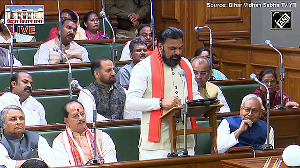Wadia group-owned GoAir made a profit of Rs 104.34 crore in FY13 compared with the Rs 133.72-crore loss in the previous year. The profit was, however, on the back of changes in accounting policies with respect to aircraft lease rentals.  But for these changes, the airline would have made an annual loss of Rs 79.28 crore, the company’s auditor observed in its report. The auditor's report is included in the balance sheet filed with the corporate affairs ministry.
But for these changes, the airline would have made an annual loss of Rs 79.28 crore, the company’s auditor observed in its report. The auditor's report is included in the balance sheet filed with the corporate affairs ministry.
GoAir, the smallest domestic airline with a market share of 8.7 per cent, is the second domestic airline after IndiGo to post profits for the last financial year. GoAir is unlisted and, hence, does not disclose quarterly numbers. The airline has a fleet of 18 Airbus A320s operating within India.
In FY13, GoAir’s operating revenue increased 43.4 per cent to Rs 2,095 crore and its total revenue was Rs 2,132.94 crore. Total expenses rose nearly 30 per cent to Rs 2,146 crore, the airline said in its profit and loss statement filed with the corporate affairs ministry. Fuel accounted for nearly half the expenses and the fuel bill rose 31 per cent.
The airline reported a Rs 78.70 crore earnings before interest, tax, depreciation and amortisation (Ebitda) in FY13 against an Ebitda loss of Rs 52.60 crore in the previous year. It made a pre-tax profit of Rs 147 crore, compared with a pre-tax loss of Rs 183 crore in FY12.
According to contracts, a portion of the lease rent paid by an airline to the lessor is recoverable for the cost of repairs and maintenance of the aircraft. Till FY12 , GoAir treated this entire supplementary lease rent as an expense. However, last year the airline’s management changed the policy and treated only the non-recoverable lease rent amount as an expense. The balance was treated as contribution received from lessors.
As such, FY12’s expenses amounting to Rs 160 crore were shown under exceptional gain and the balance was included in FY13 expense and disclosed in the profit-and-loss
GoAir CEO Giorgio De Roni said the company made full disclosure in respect of the change in the accounting policy with regard to supplementary lease rent, in Note No. 33 to the Annual Accounts for FY13. The accounts have been drawn up in accordance with the prevailing Generally Accepted Accounting Principles and Accounting Standards (GAAP). The auditors’ report merely refers to Note No. 33 and is unqualified, De Roni said, adding that similar practice with regard to treatment of supplementary lease rent is being followed by some airlines operating in India.
According to De Roni, last year, GoAir recorded a significant increase in terms of passengers (16 per cent) and revenues (45 per cent). The growth trajectory continues this financial year also, thanks to the expansion of the fleet (23 per cent in the first half), with a growth in passengers of approximately 27 per cent in respect to the previous year.
He said that despite an overall challenging environment, high cost of fuel and the depreciation of the Indian rupee against the US dollar, GoAir is strengthening its position (with a continuously-growing market share, from 7.2 per cent in the first half of FY13 to 8.6 per cent in the same period in FY14) and confidently follows its growth strategy in the domestic market, which is set to become the third largest worldwide in the near future.
Current civil aviation rules do not allow airlines with less than five years of experience and having a fleet of less than 20 planes to fly international. With the government considering relaxing the rule, GoAir will be a beneficiary. Since GoAir has no international operations, its very little foreign currency earnings and expanding foreign network will give it a natural hedge against currency fluctuations.









 © 2025
© 2025